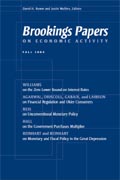As President Donald Trump begins his administration, this blog presents, on a weekly basis, a selection of what Brookings experts are writing and saying about the new administration’s early policy choices, personnel decisions, and engagements with domestic and global events. Here’s week three of the first 100 days. To receive daily updates on new Brookings research, commentary, and events, subscribe to our newsletters. Also, subscribe to and listen to our new podcast, “5 on 45,” on which experts offer rapid analysis of Trump administration and congressional policies.
Read what Brookings experts had to say about the First 100 Days in: Week Two | Week One.
FOREIGN POLICY & NATIONAL SECURITY
Senior Fellow Tamara Cofman Wittes looked at four aspects of new Secretary of State Rex Tillerson’s inaugural speech to State Department employees: his leadership, mission security, dissent, and his focus on efficiency.
Geoffrey Gertz, a post-doctoral fellow in Global Economy and Development, raises three questions about the Trump administration’s preference for bilateral trade deals over multilateral ones. On each question, Gertz says “there are reasons to worry.”
Senior Fellows Joshua Meltzer and Mireya Solís argue that President Trump’s executive order removing the U.S. from the Trans-Pacific Partnership means loss of U.S. economic growth and job creation, undercut leverage with China, and is “a blow to U.S. global leadership in determining the rules for international trade and investment in the Asia-Pacific region.”
Senior Fellows John Allen and Michael O’Hanlon, who co-direct the Center for 21st Century Security and Intelligence, write that while President Trump’s executive order on immigration and refugees responds to a “legitimate fear,” it “could do enormous harm to the broader struggle against terrorism—and thus, ultimately, to America’s own security even here in the homeland.”
Nonresident Senior Fellow Arturo Sarukhan, a former Mexican ambassador to the U.S., says that the U.S.-Mexico relationship has changed profoundly over the past two decades, mostly for the better, but is now “on a knife’s edge.”
DOMESTIC POLICY
Senior Fellow Bill Galston examines the politics of repairing versus repealing Obamacare. “The Republicans have a lot of tough policy issues to address,” Galston says. “And as a recent Gallup survey shows, they also have a political problem that will make these challenges even harder.”
Jon Valant, a fellow in the Brown Center on Education Policy, notes that “the Trump administration’s support of charters and choice may be distracting from—and contributing to—an emerging political threat to school choice programs, especially charter schools: renewed skepticism from Democrats.”
The Hamilton Project at Brookings has a new paper in which the authors note the widespread agreement of the need to address the nation’s infrastructure, but that consensus on how to fund and prioritize projects is lacking. The paper explores the pros and cons of public-private partnerships for infrastructure investments.
Nonresident Senior Fellow Blair Levin has a three part series that examines broadband policy in the Trump administration. “If affordable and abundant broadband is integral to the continued growth of the American economy,” Levin argues, “then how the market reacts to Trump administration policy will determine whether the country can deliver this necessary infrastructure.”
Rachel Augustine Potter, an University of Virginia professor writing for the new Center on Regulation and Markets at Brookings, examines President Trump’s initial moves to undo the regulatory state, noting the “institutional factors that will present formidable obstacles to the new administration’s anti-regulatory agenda.”
On February 16, the center co-hosts an event to launch of the new Brookings Institution Press book, “Achieving Regulatory Excellence,” which offers guidance from experts around the world for how regulators in all fields of policy can succeed in today’s demanding environment.
Nonresident Senior Fellow Bob Pozen looks at what will happen to the Dodd-Frank financial regulations under President Trump’s executive order.
JB Vowell, an Army colonel and currently the Army Chief of Staff’s Senior Fellow to the Brookings Institution, examines the confirmation of David Shulkin as the next Secretary of Veterans Affairs.
Bob Sussman asks whether President Trump can roll back the Obama emissions and fuel efficiency standards for light-duty vehicles.
—
For more details policy recommendations and analyses from Brookings experts for the new administration, see “Brookings Big Ideas for America” on issues including the threatened middle-class dream in America, health care, criminal justice reform, infrastructure, U.S. alliances, nuclear weapons, terrorism, and regional conflicts.




Commentary
President Trump’s First 100 Days: What Brookings experts are saying, 2/10/17
February 10, 2017